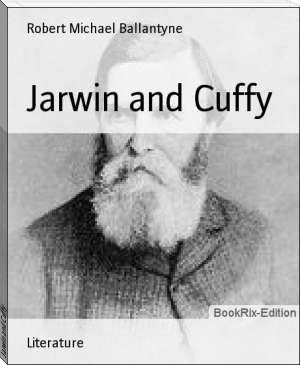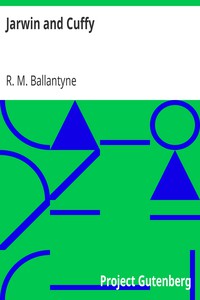Jarwin and Cuffy, Robert Michael Ballantyne [good books to read in english TXT] 📗

- Author: Robert Michael Ballantyne
Book online «Jarwin and Cuffy, Robert Michael Ballantyne [good books to read in english TXT] 📗». Author Robert Michael Ballantyne
It is needless to recount all the details of the building and provisioning of this raft. Suffice it to say that, about three weeks after the idea of it had been conceived, it was completed and ready for sea.
During his residence on the island, although it had only extended over a few months, Jarwin had become very expert in the use of a sharp-pointed pole, or javelin, with which he had become quite an adept in spearing fish. He had also become such a dead-shot with a stone that when he managed to get within thirty yards of a bird, he was almost certain to hit it. Thus he was enabled to procure fish and fowl as much as he required and as the woods abounded with cocoa-nuts, plums, and other wild fruits, besides many edible roots, he had no lack of good fare. Now that he was about to "go to sea," he bethought him of drying some of the fruits as well as curing some fish and birds. This he did by degrees, while engaged on the raft, so that when all was ready he had a store of provisions sufficient to last him several weeks. In order to stow all this he removed another log from the middle of the raft, and, having deposited the food in the hollow--carefully wrapped in cocoanut leaves and made into compact bundles--he covered it over by laying a layer of large leaves above it and lashing a small spar on the top of them to keep them down. The cask with which he had landed from the original raft, and which he had preserved with great care, not knowing how soon he might be in circumstances to require it, served to hold fresh water.
On a fine morning about sunrise, Jarwin embarked with his little dog and bade farewell to the coral island, and although he had not dwelt very long there, he felt, to his own surprise, much regret at quitting it.
A fresh breeze was blowing in the direction of the island--or the supposed island--he wished to reach. This was important, because, in such a craft, it was impossible to sail in any way except before the wind. Still, by means of a rude oar or paddle, he could modify its direction so as to steer clear of the passage through the reef and get out to sea.
Once outside, he squared the sail and ran right before the breeze. Of course such a weighty craft went very slowly through the water, but the wind was pretty strong, and to Jarwin, who had been for a comparatively long time unaccustomed to moving on the water, the speed seemed fast enough. As the island went astern, and the raft lifted and fell gently on the long swell of the ocean, the seaman's heart beat with a peculiar joy to which it had long been a stranger, and he thanked God fervently for having so soon answered his prayer.
For a long time he sat reclining in the hollow of the raft, resting his hand lightly on the steering oar and gazing in silence at the gradually fading woods of his late home. The dog, as if it were aware that a great change was being effected in their destiny, lay also perfectly still--and apparently contemplative--at his master's feet; resting his chin on a log and gazing at the receding land. It was evident, however, that _his_ thoughts were not absent or wandering, for, on the slightest motion made by his master, his dark eyes turned towards him, his ears slightly rose, and his tail gave the faintest possible indication of an intention to wag.
"Well, Cuffy," said Jarwin at last, rousing himself with a sigh, "wot are 'ee thinking of?"
The dog instantly rose, made affectionate demonstrations, and whined.
"Ah, you may well say that, Cuff," replied the man; "I know you ain't easy in yer mind, and there's some reason in that, too, for we're off on a raither uncertain viage, in a somewhat unseaworthy craft. Howsever, cheer up, doggie. Whoever turns up, you and I shall sink or swim together."
Just then the sail flapped.
"Hallo! Cuff," exclaimed Jarwin, with a look of anxiety, "the wind's going to shift."
This was true. The wind did shift, and in a few minutes had veered so much round that the raft was carried away from the blue line on the horizon, which Jarwin had so fondly hoped would turn out to be an inhabited island. It blew lightly, however, and when the sun went down, had completely died away. In these circumstances Jarwin and his dog supped together, and then lay down to rest, full of sanguine hope.
They were awakened during the night by a violent squall, which, however, did no further damage than wash a little spray over them, for Jarwin had taken the precaution to lower and make fast the sail. He now turned his attention to preparing the raft for rough weather. This consisted in simply drawing over the hollow--in which he, his dog, and his provisions lay--a piece of canvas that he had cut off the sail, which was unnecessarily large. It served as a tarpaulin, and effectually shielded them from ordinary sprays, but when the breeze freshened to a gale, and green seas swept over the _raft_, it leaked so badly, that Jarwin's cabin became a salt-water bath, and his provisions by degrees were soaked.
At first he did not mind this much, for the air and water were sufficiently warm, but after being wet for several hours he began feel chilled. As for poor Cuffy, his trembling body bore testimony to the state of his feelings; nevertheless he did not complain, being a dog of high spirit and endurance. In these circumstances the seaman hailed the rising sun with great joy, even although it rose in the midst of lurid murky clouds, and very soon hid its face altogether behind them, as if it had made up its mind that the state of things below was so bad as to be not worth shining upon.
All that day and night the gale continued, and they were driven before it. The waves rushed so continuously and furiously over the raft, that it was with the utmost difficulty Jarwin could retain his position on it. Indeed it would have been impossible for him to have done so, if he had not taken the precaution of making the hollow in the centre, into which he could crouch, and thus avoid the full force of the seas. Next day the wind abated a little, but the sea still rolled "mountains high." In order to break their force a little, he ventured to show a little corner of the sail. Small though it was, it almost carried away the slender mast, and drove the raft along at a wonderfully rapid rate.
At last the gale went down, and, finally, it became a dead calm, leaving the raft like a cork heaving on the mighty swell of the Pacific Ocean. Weary and worn--almost dead with watching and exposure--John Jarwin lay down and slept, but his slumber was uneasy and unrefreshing. Sunrise awoke him, and he sat up with a feeling of deep thankfulness, as he basked once more in its warm rays and observed that the sky above him was bright blue. But other feelings mingled with these when he gazed round on the wide waste of water, which still heaved its swelling though now unruffled breast, as if panting after its recent burst of fury.
"Ho! Cuffy--what's that? Not a sail, eh?" exclaimed Jarwin, suddenly starting up, while his languid eyes kindled with excitement.
He was right. After a long, earnest, anxious gaze, he came to the conclusion that it _was_ a sail which shone, white and conspicuous, like a speck or a snow-flake on the horizon.
CHAPTER FIVE.
JARWIN AND CUFFY FALL INTO BAD COMPANY.
Immediately on discovering the sail, Jarwin hoisted a small canvas flag, which he had prepared for the purpose, to the mast-head, and then sat down to watch with indescribable earnestness the motions of the vessel. There was great cause for anxiety he well knew, because his raft was a mere speck on the great waste of waters which might easily be overlooked even by a vessel passing at a comparatively short distance, and if the vessel's course should happen to lie across that of the raft, there was every probability she would only be visible for a short time and then pass away like a ray of hope dying out.
After gazing in perfect silence for half-an-hour, Jarwin heaved a deep sigh and said--
"She steers this way, Cuffy."
Cuffy acknowledged the remark with a little whine and a very slight wag of his tail. It was evident that his spirits had sunk to a low ebb, and that he was not prepared to derive comfort from every trifling circumstance.
"Come, we'll have a bit of summat to eat, my doggie," said the sailor, reaching forward his hand to the provision bundle.
Thoroughly understanding and appreciating this remark, Cuffy roused himself and looked on with profound interest, while his master cut up a dried fish. Having received a large share of it, he forgot everything else, and devoted all his powers, physical and mental, to the business in hand. Although Jarwin also applied himself to the food with the devotion of a man whose appetite is sharp, and whose strength needs recruiting, he was very far indeed from forgetting other things. He kept his eyes the whole time on the approaching sail, and once or twice became so absorbed and so anxious lest the vessel should change her course, that he remained with his mouth half open, and with the unconsumed morsel reposing therein for a minute or more at a time.
But the vessel did not change her course. On she came; a fine large schooner with raking masts, and so trim and neat in her rig that she resembled a pleasure-yacht. As she drew near, Jarwin rose, and holding on to the mast, waved a piece of canvas, while Cuffy, who felt that there was now really good ground for rejoicing, wagged his tail and barked in an imbecile fashion, as if he didn't exactly know whether to laugh or cry.
"We're all safe now, doggie," exclaimed Jarwin, as the schooner came cutting through the water before a light breeze, leaving a slight track of foam in her wake.
When within about two or three hundred yards of the raft, the castaway could see that a figure leant on the vessel's side and brought a telescope to bear on him. With a feeling of irrepressible gladness he laughed and waved his hand.
"Ay, ay, take a good squint," he shouted, "an' then lower a boat--eh!--"
He stopped abruptly, for at that moment the figure turned towards the steersman; the schooner's head fell away, presenting her stern to the raft, and began to leave her behind.
The truth flashed upon Jarwin like a thunderbolt. It was clear that the commander of the strange vessel had no intention of relieving him. In the first burst of mingled despair and indignation, the seaman uttered a bass roar of defiance that might have done credit to the lungs of a small carronade, and





Comments (0)